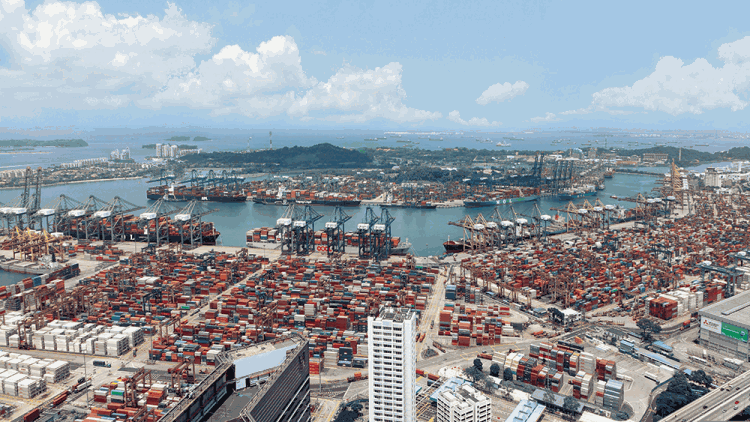
After a long break, the Transported Asset Protection Association (TAPA) once again held a conference in Johannesburg in March. Falling under the TAPA EMEA banner, the conference touched on a number of issues facing the logistics market in EMEA, with a range of speakers covering a variety of topics.
TAPA was founded as a not-for-profit industry association in 1997 in the EU to help manufacturers and shippers, and their logistics service providers, minimise losses from their supply chains resulting from cargo thefts. Since then the organisation has developed world-renowned standards and offers training, incident intelligence, route planning and networking tools used by members to manage risk and optimise loss prevention.

While TAPA has been operating in South Africa for some time, the organisation is set to expand its African footprint, while also increasing its local membership. One of the services TAPA provides, according to Thorsten Neumann, President and CEO of TAPA EMEA, is an intelligence service highlighting areas where cargo crimes have occurred, allowing its members to plan safer routes and rest stops. In addition to providing this information to members, authorities such as Europol and Interpol are also able to access the data to assist in their law enforcement strategies.
Supply chain resilience
Resilience was the theme of the conference, which began with a presentation from Neumann. While cargo crimes, within warehouse or other transportation environments (like airports and ports) is a global problem, South Africa wins the gold when it comes to violent crimes like hijacking of trucks. Official police statistics show yet another increase in hijackings in Q4 2022, totalling 492 incidents in only 92 days. That number excludes cash-in-transit robberies, of which 56 were reported over the same period.
Neumann stressed that dealing with this level of crime requires a resilient approach from companies to apply the best standards and use the intelligence available to protect people and assets. The day ended with a session focused on the TAPA EMEA Intelligence System (TIS), which includes European and South African statistics, and is available to all members to assist in planning. As noted, it is also shared with law enforcement authorities to assist in their work.
While TIS can still expand its services in South Africa, and Africa, it is a leading source of cargo crime statistics in Europe. Expansion will come as more members sign up to TAPA and start contributing information – done anonymously and verified before publication. (Read more about TIS at https://tapaemea.org/incident-service/).

A half-day conference followed the main event where TAPA focused on its three standards, all designed to be a ‘framework to manage known risks, reduce loss exposure, protect assets, improve people security, and save the heavy financial and reputation costs which can result from a cargo theft incident’.The three standards are:
• Facility Security Requirements (FSR): FSR protects high value and theft-targeted products in facilities, such as warehouse operations and distribution centres. The FSR Standard is reviewed every 3 years, in consultation with TAPA members, to ensure its effectiveness and efficiency, and to address new or emerging threats to supply chain security. The next revision of the Standard is due to come into force in mid-2023.
• Trucking Security Requirements (TSR): Over 90% of cargo losses reported to TIS involve criminal attacks on vehicles. TAPA EMEA’s TSR standard has been developed to protect products transported by road and aims to ensure the safety of drivers, vehicles, and cargoes by preventing criminal attacks. The TSR is also reviewed every three years, with the next revision due in mid-2023.
• Parking Security Requirements (PSR): Trucks parked in unsecured parking places are involved in over 50% of the cargo losses reported to TIS in the Europe, Middle East and Africa region every year, and involve thefts of products valued at tens of millions of Euros. TAPA says these crimes are exacerbated by the severe lack of secure parking places in the region. Launched in 2019, the PSR is now the most-adopted secure parking standard in EMEA. Facilities that meet the PSR standards listed in the organisation’s ‘secure trucking database’, allow companies to use secure facilities for their long-haul fleets.
More on the TAPA EMEA standards and training opportunities can be found at https://tapaemea.org/standards-trainings/.
The impact of crime on business
Neumann was followed by Busisiwe Mavuso, Chief Executive Officer at Business Leadership South Africa (BLSA), an independent association whose members include the leaders of some of South Africa’s biggest and most well known businesses. She delivered a dynamic talk, calling a spade a spade when it comes to crime in South Africa and the impact it has had, and will still have, on the country and its people.
Most of the audience was not used to such straight talk and Mavuso was interrupted with applause on more than one occasion with her frank analysis of the situation. She made too many good points to repeat here, but one of the key messages in her talk, in this writer’s opinion, was that South Africa is suffering from an acute failure of leadership. Another critical area the country needs to address as a matter of urgency is the youth unemployment rate. Even the most doctored statistics show that more than 50% of young people, who should be entering the job market, are unable to; if this is not addressed urgently, it simple cannot end well.
If more business leaders were to speak out about the critical issues facing South Africa (crime, Eskom, railways, ports, roads etc.), in such a frank and honest manner, perhaps those in power would be driven to perform.
The benefits of standards
Waheed Mohamed, General Manager at TITAN Aviation Group and the TAPA EMEA SA Regional Lead was up next talking about supply chain security threats and the benefits of security standards in business operations. Mohamed made the point that people spend a lot of money on security but it often does not work. Companies need to make sure that their investment in security is worthwhile.
The standards set up by TAPA assist companies in covering their internal and external risks, and also include training to ensure the process is not something that happens every now and then at the certification stage, but that the standards are maintained consistently.
The primary concern is that risk managers make sure the tools they use work for them and achieve the goals required. In terms of cargo protection at airports, the TAPA FSR certification exceeds the standards required by the CAA, providing those organisations with proven, current risk management processes that will stand them in good stead with official inspectors while also preparing them for the criminal onslaught.
While security standards seem to see everything in black and white, the real world we operate in is never that simple. However, when applied correctly, the standards prepare the organisation and its staff to handle whatever is thrown at them. While the police respond to crimes, the business must focus on standards that give them a preventative edge.
Pay as much attention as the criminals
Martin Taylor, Risk Manager at Rhenus Logistics, presented a case study of a recent attempted robbery to highlight what logistics companies are facing today. While he could not give away too much information, he did note that the criminals involved monitored the site carefully to see all the processes in operation (with insider help), and to identify who could disrupt their operation. They were so organised that they changed the branding on the truck they were using at the last minute and ensured the participants had the correct uniforms.
Dealing with issues like this means a freight company needs to continually check employees in case they have been compromised and change its modus operandi so there is no set pattern criminals can follow. He also noted that in this instance, effective access controls were key to protecting the cargo.
Do not ignore cybersecurity
While logistics companies are understandably focused on their day-to-day business and protecting their people and the assets under their care, whether in a warehouse, holding cage or on the road, ignoring the cybersecurity threat every company and person faces is a bad business move.
Craig Pedersen, head of TCG Forensics delivered a talk on cybersecurity, showing how easy it can be to get critical information from people that provides criminals the way into business systems. He mentioned cases where companies ground to a halt because of ransomware. While the temptation is to pay the ransom, there is no guarantee that you will get all your data back and that your systems will be running as required.
When cyberattacks involve direct fraud, an invoice that is paid into the wrong account for example, he notes that there is little chance of getting your money back. He says those who do recover some money rarely get more than 20% of what was lost. This means cyber protection and training is no longer something for the IT people only.
The motivations behind cybercrime are the same as physical crime, but the manner in which it is done is very different. All you need is a laptop, a data connection and a few skills – and today these skills are often available online as a service. The crime can be committed alone or with a group, from anywhere in the world. The result is that the likelihood of capture is even less than that for physical crimes, meaning the risk of consequences is minimal, but the profits are high.
O. R. Tambo International Airport
Brigadier Duncan Scott from SAPS gave the delegates an overview of what was happening at O. R. Tambo International Airport (ORT) in terms of supply chain law enforcement. He touched on the formation of the integrated Border Management Authority, which will streamline control and compliance at all the borders in the near future, before talking about the issues dealt with at ORT and the successes SAPS has achieved.
Insiders play a major role in facilitating crimes (either for the profit, or because they are compromised because of previous activities they were involved in) making it hard for management to exercise any kind of moral authority. Of course, intimidation is also a real issue when it comes to getting insiders to cooperate, even if it is turning a blind eye. This is leading to an increased use of technology to assist in enforcing the rules, with humans used for security only when needed (although there is still a large need for people).
Some of the crimes the security team at ORT faces include human trafficking and smuggling, as well as narcotics and currency smuggling. It is a never-ending battle waged against individuals as well as well-organised crime syndicates.
Following Scott, Alida van Zyl, Aviation Security, Risk and Investigations Manager SSA at DHL Express, presented a case study on multi-site certification to TAPA standards. This was followed by another real-life case study from Johan Hurter.
The final session of the day was hosted by Thorsten Neumann and Markus Prinz from TAPA EMEA, in which they went further into how companies can use TIS to reduce cargo losses and increase supply chain resilience. A short half-day conference the following day drilled down into the TAPA EMEA standards and certifications.
Find out more about TAPA at www.tapaemea.org
| Tel: | +27 11 543 5800 |
| Email: | [email protected] |
| www: | www.technews.co.za |
| Articles: | More information and articles about Technews Publishing |

© Technews Publishing (Pty) Ltd. | All Rights Reserved.